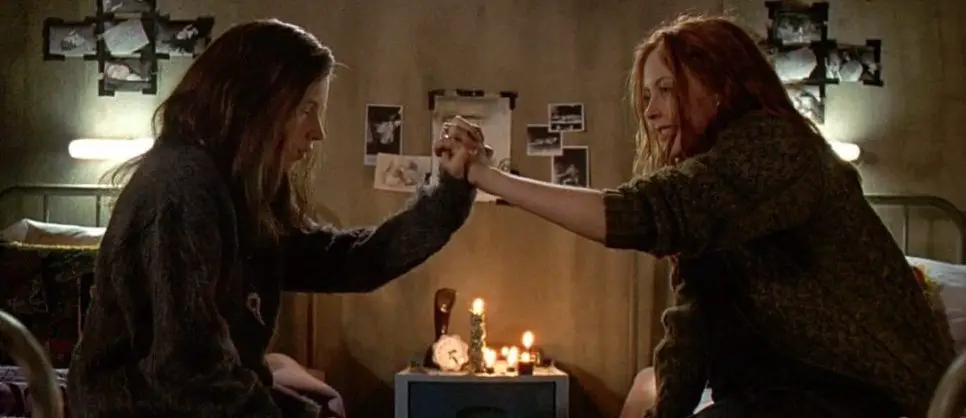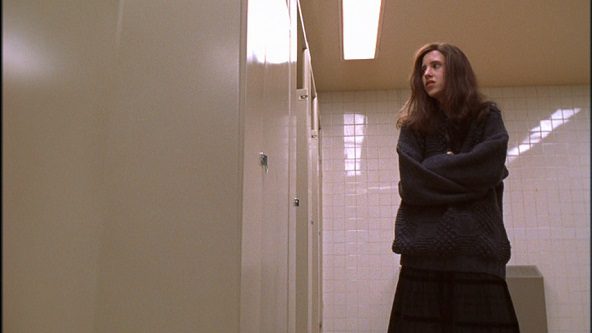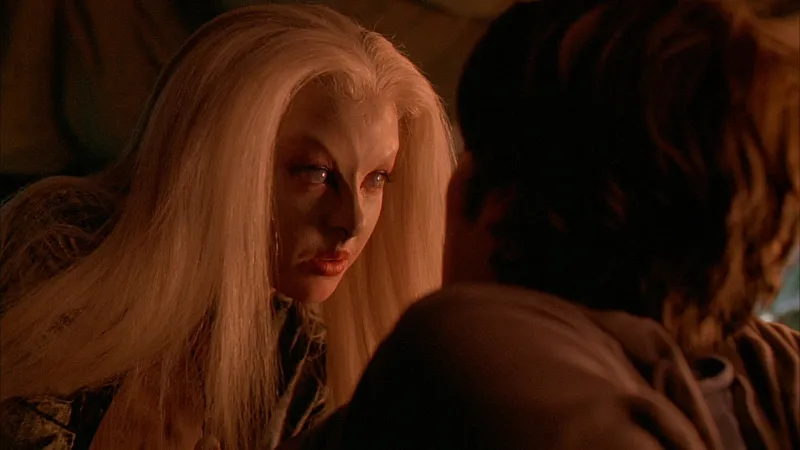Horror movies dealing with puberty and the emotional baggage girls on the cusp of womanhood must face are not new. Yet, werewolf movies dealing with girlhood are. Thankfully, the 2000 Candian Ginger Snaps rectified that with a whip-smart and complex feminist lens to boost.
Directed by John Fawcett, who would go on to co-create “Orphan Black,” Ginger Snaps takes the werewolf mythos and changes it around. However, Karen Walton’s script gives Fawcett more than enough material to work with. Together, the two craft an acerbic and heartfelt story about a sisterhood with more than faint undertones of Queerness.

Two sisters, Brigitte (Emily Perkins) and Ginger Fitzgerald (Katherine Isabelle), are outcasts living in the quaint Ontario suburbs of Bailey Downs. What’s interesting about Walton’s script is that the two are outcasts by choice. Their upper-middle-class life fills them with dread, so much so that the two have made a suicide pact to kill each other before entering adulthood.
“Suicide is the ultimate fuck you.” But what sets Ginger Snaps apart is how nuanced it is in its portrayal of adolescence. Brigitte is fifteen and Ginger is sixteen, and both have yet to start menstruating. Ginger’s body is beginning to develop in a way that boys are beginning to notice, and their attention isn’t going unnoticed by her. But Brigitte still has zero interest in boys and seems oblivious to their existence. She’s also afraid people would laugh at her dead body.
Meanwhile, the two must suffer under the loving gaze of their mother, Pamela (Mimi Rogers). Pamela is the kind of mother who brings up the joy of menstruation at the dinner table when it’s clear that neither the daughters nor the father, Henry (John Bourgeois), wishes to discuss it. Walton’s script adroitly paints a picture of suburban hell, with Brigitte and Ginger attempting to rebel but finding nothing but love and support.
The two death-obsessed teens stage elaborate and gory murder and suicide scenes for a class project. The loneliness and emptiness they feel come less that nobody understands and more from a time in their life when everything is either changing or feels like it’s about to change and fills them with a yawning horror.
In the background are the pet slayings by what the neighborhood is calling “The Beast of Bailey Downs.” The girls are somewhat fascinated by it but are far too consumed by their hatred of Trina (Danielle Hampton), the popular girl at their school. That is until Ginger is attacked by the beats while attempting to prank Trina. A prank, I might add, is so cruel that it can only be thought up by teenagers.
Walton’s script and Fawcett’s direction give us a werewolf movie where the term “werewolf” is never mentioned; they say “lycnathorpe.” As if the word “werewolf” is too weird, but “lycanthrope” has a feeling of legitimacy to it. This adds to the playful yet earnest tone of Ginger Snaps. A style with a pervasive attitude of “this can’t be happening” that thankfully gives way to “this is happening” in a span of time that doesn’t make one pull their hair out in frustration.

Thankfully, Walton also doesn’t give us any real villains. In a lesser movie, Trina would be the “mean girl” instead of how Walton and Fawcett depict her as another teenage girl battling hormones and societal pressure. Werewolf movies have always had a throbbing sense of pathos and empathy, with Lon Channey Jr. being the most infamous to play a poor soul turned into a snarling monster.
But Fawcett and Walton strive to ensure empathy spreads to all the women; Pamela and Trina are more than stock figures. Instead, they are complex; Trina is jealous and hurt because she thinks the local drug dealer Sam (Kris Lemche), whom she had a crush on, is now crushing on Ginger. Moreover, we discover that she gives her virginity and feels used. Of course, neither Ginger nor Brigitte is interested, but Trina’s anger, while not justified, is understood to a degree. She’s not angry, she’s hurt.
Yet, at the same time, Sam isn’t the “cherry hound” he’s rumored to be. His friendship with Brigitte is built on trying to figure out what the hell is going on and not, as Ginger believes, him being a perv. “Biology, now there’s something you can sink your teeth into, so to speak. You’re real. Your problem is real. The solution is real.” He’s not the love interest; he’s Ginger’s replacement, as it were. The support she lost once her sister began to change.
Once Ginger starts to change, so does the bond between the sisters. Ginger’s already changing body is undergoing an even more drastic change as she embraces her newfound raging hormones. Fawcett and Thom Best’s camera do a splendid job of showing Ginger form into a sexual being without sexualizing her.
Even the tried and true staple of every high school movie where the outcast shows up to school, dressed to the nines, with newfound confidence and struts down the hallway like they have the world by the proverbial tale, it is Ginger’s pure sense of self that they frame without objectification.
Speaking of tails, Ginger is horrified to learn she has one now. She also finds hair growing on her chest. But that vestigial tale must be strapped down for gym class. In these moments, the Queer readings become the most blatant, the body dysmorphia that can arise from puberty, the feeling that one is an alien in their own body.
Fawcett captures this perfectly by showing Ginger’s rebellious attitude become sharper more feminized, as it were, as the beast within takes over. Isabelle is excellent as she plays the dopamine high of being noticed with the horror of her rapidly changing world. Fawcett sprinkles teen magazines on the edges of the frame once Ginger transforms, showing how much of her confusion comes from the world outside as much as the world inside.
All the while, Brigitte looks on helplessly as her sister’s behavior and appearance make her more and more of a stranger. They may only be a year apart, but that may as well be a decade in teenage years. Brigitte tries to help her sister even as Ginger gives in to the bestial part of her.
But again, Walton’s script goes in exciting directions by staying true to the genre. “I get this ache…and I thought it was for sex, but it’s to tear everything to fucking pieces.” All werewolves have moments where they enjoy their newfound powers or feelings of such but soon discover they are slipping away. Isabelle’s Ginger is no different.
The sex scene in the backseat of the car is a sly turn of a visual phrase. The boy in question, Jason (Jesse Moss), who had bullied Isabelle before her “transformation,” is now unnerved by her aggressiveness. Fawcett turns the trope on its head by merely swapping the perceived gender places. The final touch is that Ginger can give her lycan-ism as an STD.
I’ve been watching a slew of horror films for October, but few scenes had me squirming like I did when Jason began urinating blood in the men’s room. That tapped into something profoundly primal and nightmarish. It could also be read as a boy menstruating and the traumatic horror of what that must be like for anyone when it happens.

Walton’s dedication to the metaphor is sublime. Fawcett sticks to the visual metaphor with his blood usage and how comfortable Isabelle becomes with it. Isabelle, though, gives her whole self to these moments, writhing and growling in a way that would cement her as her generation’s scream queen.
Isabelle and Perkins are phenomenal as sisters. Their physical and emotional contrasts feed into the sisterly chemistry that seems almost twin-like. Ginger’s transformation is all the more heartbreaking as we can see it killing Ginger and destroying Brigitte as she desperately tries to save her sister.
Perkin’s Brigitte is often overlooked because, by design, it’s not as showy as Isabelle’s. But Perkins is the emotional anchor to Ginger Snaps. Her helplessness and fear for her sister give Ginger Snaps its heart. So much so that when Ginger mocks her about how she swore she’d die for her, Brigitte’s retort stings because we can feel the hurt and pain in it. “No, you said you’d die with me ’cause you had nothing better to do.” The two even argue like sisters to the bloody, bitter end.
The special effects and make-up are wonderfully visceral. There’s a low-budget gruesomeness to them that Best’s washed-out lighting makes palpable. Made in the 00s, Ginger Snaps is bathed in cold blue and grays, with the colors washed out to a sterlized mutedness. Best hides the Ginger’s final form in shadows, only giving us glimpses until the end, and even then, it’s not a clear shot. Leaving the monster only partially revealed allows a more haunting image to live in our minds.
Ginger Snaps is so good that even its formulaic aspects are well done, for the most part. Rodger’s Pamela has a beautiful scene towards the end with Brigitte, revealing the self-awareness teenagers always assume their parents don’t possess. But it’s blunted by her total absence afterward. Yet, the final scene is so poetic and tragic that whatever minor flaws could be forgiven.
Images courtesy of Motion International
Have strong thoughts about this piece you need to share? Or maybe there’s something else on your mind you’re wanting to talk about with fellow Fandomentals? Head on over to our Community server to join in the conversation!

